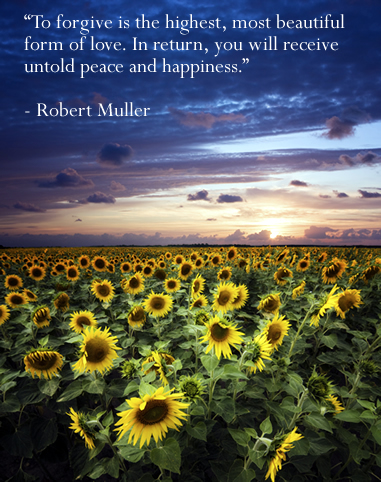what Forgiveness means … (07/16/09)
Greetings, my Friends!
.
This message was inspired by a mistake I made. It is not important to know exactly what my error was, nor is it important to know the impact it had on others (though I am very thankful that no one was seriously harmed by my miscue). I am also not seeking personal reconciliation from anyone for the harm I did — not only have I already forgiven myself for my unintentional “sin”, but folks are actually blaming another person for my mistake (despite my protests to the contrary). And it is this misplaced blame that has caused me the most pain, that has led to this correspondence — the following few words on criticism, condemnation and forgiveness …
.
I could start by reminding you that we have all engaged in behaviors that have seriously harmed others. 99.9% of us have done so unintentionally, and yet done so we have. It is the nature of the human journey to be tempted to lash out in fear or hoard in selfishness, and to thereby harm others in the process. We have all done so at one time or another, and it is patently hypocritical to condemn another for doing the same — even if their “crime” is “worse” than our own.
.
I could also encourage us all to look to those situations where we criticize others, and pause long enough to remember that we could very well have made the very same mistakes “but for the grace God”. This is not a call to condone the other’s mistakes or excuse their hurtful choices, but rather provides us all with a simple remembrance of a simple Truth: each one of us has unique challenges to “do good” based upon our unique genetic make-ups and our unique upbringings. In this sense, our compassion for the other comes not from saying “I could have made that mistake”, but rather from admitting that, if we were placed in such a situation with the same personal psyche of the “perpetrator”, we could very easily have made a similar error. This doesn’t condone the other’s error, of course, but it does dampen our condemnation of the same — a condemnation that is as ineffective as it is arrogant.
.
I could focus on the afore-mentioned Truths here — but I won’t … Indeed, it is my intention to get away from discussing the moral tenants of “letting those without sin cast the first stone” & “removing the beam from our own eye before pulling the mote from our brother’s”.
.
Instead, I wish to speak of practicality — what happens when we criticize & condemn, and what alternatives we have to doing so. And the point I make is a simple one: when you criticize another for their mistakes, you are actually powerfully encouraging them to repeat those errors! You are doing so on a subconscious level, yes, and yet that level is the more potent one. If another makes a mistake and you judge him/her negatively, their self-esteem is wounded as a result, and they are that much more likely to repeat their error in the future. This is not rocket-science — this is basic human psychology.
.
And so we are left with the all-important question: If you truly want the other to stop making a particular mistake, why do you condemn them and thereby encourage him/her to repeat the same?
.
This is not to say that you are to stop using others’ mistakes to help you discern what is right or wrong action for yourself. Discernment is valuable — it is condemnation that perpetuates our crises. It is one thing to mention to another that their actions have caused pain and to announce your desire that those actions cease. It is quite another thing to condemn the person doing those deeds by labeling them as “bad” or “irresponsible” or “dishonest” or “evil”.
.
And this is where the practical alternative comes into play — the alternative of “radical forgiveness”. This option recognizes that a mistake was indeed made — a mistake that caused you or another harm, and then it immediately forgives the perpetrator of that harm — affirming your belief that he/she will not make the same mistake again, and affirming your unconditional love for them as a person whether they do so again or not. Ironically, it is this unconditional affirmation of the other’s innate worth as a Human being that tends to prevent the “bad” behavior from resurfacing, and that drastically diminishes your suffering even if the mistake is repeated in the future.
.
In closing then, I wish to let you all know that I apologize for any harms I might have caused you (indirectly or directly) — even as I now affirm my unconditional Love for each of you by forgiving you all the pains you might have caused me (indirectly or directly) …
.
You are now free to go forth today and remake your lives as the radically Kind beings you innately are …
Have fun with that!
.
your Friend unconditionally,
Scaughdt





 ;
;